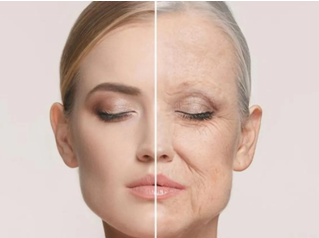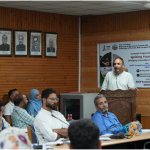Dr. AIJAZ HASSAN GANIE & DR. SHOWKAT AHMAD GANIE
There are different theories regarding ageing like genome damage to DNA, telemere shortening, epigenetic malfunctions; misfolding of proteins, cell senescence, stem cell exhaustion, glycation, AMPK pathways etc. and most of these studies demonstrate the aging is nonreversible process, however, the recent study published in Cell on 12th December 2023 by Yang et al. (2023) revealed ageing can be accelerate or reverse. The most accepted theory regarding ageing is mutations of DNA that over time can disrupt a cell’s normal operations and trigger the process of cell death. But this theory was not supported by the fact that the cells of older humans were often not riddled with mutations, and that animals or humans harboring a higher burden of mutated cells do not appear to age prematurely.
Yang and his coworkers under the leader ship Dr. David Sinclair, Professor of genetics and co-director of the Paul F. Glenn Center for Biology of Ageing Research at Harvard Medical School focused on another part of the genome, called epigenome. Since all cells have the same DNA blueprint, it is the epigenome that allows skin cells to become skin cells and brain cells to become brain cells. It does this by giving different instructions to different cells as to which genes to turn on and which to keep silent. Epigenetics is similar to the instructions that pattern dressmakers rely on to make shirts, pants, or jackets. The starting fabric is the same, but the pattern dictates the form and function of the final garment. In cells, the epigenetic instructions result in cells with different physical structures and functions in a process called differentiation.
The results of their study support this theory. The authors give the analogy of how software programs work from the hardware, but sometimes get corrupt and require a reboot, the team members argued ageing would not have been reversed if a cell became full of mutations. The group demonstrated that the ageing is a reversible process and claimed that it means the system is intact and there is a backup copy and only the software needs to be restarted.
In mice the workers devised a way to reboot cells to restart the backup copy of epigenetic instructions, by easing the corrupted signals that put cells on the path to ageing. They mimicked the effects of ageing on the epigenome by introducing breaks in the DNA of young mice. Outside the lab, epigenetic changes can also be caused by a number of things like smoking, pollution or chemicals etc. The mice when get aged by these treatments begins to develop gray fur, lower body weight despite unchanged diet, reduced activity and increased fragility.
In this case gene therapy is similar to reboot, three genes that instruct cells to reprogram were targeted- these genes are a set of four genes Yamanaka a Noble Laureate discovered in 2006, the author reported that these genes can turn back the clock in adult cells to their embryonic stem cell state and can begin development and differentiation again. These workers in mice cells use cells without erasing epigenetic history and just restart it to reset epigenetic instructions using the above mentioned genes they turned back the clock by about 57%, enough to make mice youthful again. That is why Prof. Sinclair recently told that When he saw an old person, he don’t see him as old but just see him as someone whose systems needs a reboot.
The cells rejuvenation in mice was attained but will it work with humans as well- this team of scientists has humans as next target in this regard. In 2020, the same team of workers restored the vision in older mice. The results of current research showed that the system of restoration can not only be applied in one tissue or organ but to entire organism. The team is confident that eye disease in human will be the first condition used to test this reversal of ageing as gene therapy is directly possible into the eye area. This kind of therapy is going to be the new way of thinking about the medicine and therapies.
With the advent of these new systems a wide range of diseases can be treated which include: heart neurological disorders etc. These diseases could be treated in large part by reserving the ageing process that leads to them and also an important new tool for researchers to study such conditions and other age related processes.
Though the process of reversing age is mind-boggling but it has also raised the questions of bioethics and society has to ponder what it mean to keep turning back the clock on ageing.That is why the leader of this research group Prof. Sinclair told that the new system will raise more questions than answers and how this system will get accepted at societal level remains to be seen. The balance of the evidence suggests that this system is going to be beneficial for human kind to provide new avenues in terms of health care and rejuvenation of organs.
(Dr. Aijaz Hassan Ganie is associated with Botany Department, Kashmir University and Dr. Showkat Ahmad Ganie is associated with Clinical Biochemistry, Kashmir University)








